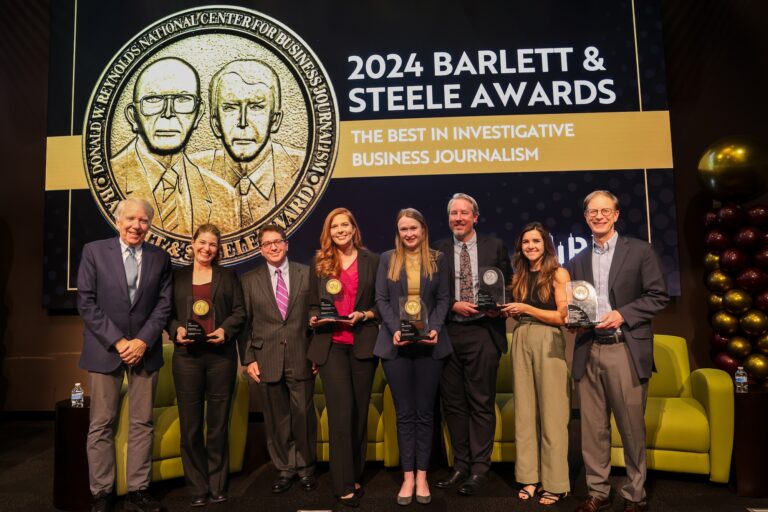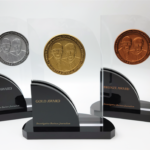The winners of the 19th Annual Barlett and Steele Awards for Investigative Business Journalism highlighted the variety of ways and the extent to which the public’s health is impacted – oftentimes negatively – by companies’ pursuit to maximize profits. Each award-winning investigation shed light on a systematic abuse that has left Americans disadvantaged in the face of corporate power, in some cases leading to the loss of homes, health, and even life.
In the Global and National category, the top honor goes to ProPublica for a gripping investigation into the million-dollar price tags applied to lifesaving medications by pharmaceutical companies driven by profit and enabled by a lack of federal oversight. Among regional and local publications, the San Francisco Chronicle took the top prize for uncovering how a faulty estimator tool left homeowners drastically underinsured, sometimes by hundreds of thousands of dollars, yet it is still used by many major insurers to set coverage limits. The 2025 Award for Outstanding Young Journalist goes to Alexa York at The Blade for stellar newspaper journalism that alerted her local community to radioactive groundwater contamination.
This is the fourth year that the Barlett and Steele Awards have recognized publications across two distinct categories, Global/National and Regional/Local, in order to honor more of the incredible investigative work being done across the United States. Each category features a Gold, Silver, and Bronze award. These awards come with cash prizes of $3,000, $2,000, and $1,000, respectively. The Outstanding Young Journalist Award features a cash prize of $3,000. The Barlett and Steele Awards are named for the illustrious investigative business journalist team of Donald L. Barlett & James B. Steele.
“This extraordinary work is business investigative journalism at its best – probing behind the headlines to illuminate matters of great public interest,” said James B. Steele.
The Gold Award in the Global/National category was won by ProPublica reporters Robin Fields and David Armstrong for a stunning investigation into the exploitative pricing tactics used on life-saving medications. Their investigation shed light on how the greed of pharmaceutical companies – not manufacturing or research costs – drives up the price of life-saving medication astronomically to maximize company profits, with one such medication having a price tag of 26 times that of its production cost.
The Silver Award in the same category goes to reporters from STAT for their “Health Care’s Colossus” series that revealed how UnitedHealth has guaranteed impressive profit growth by purchasing clinics, contracting with the federal government through Medicare Advantage, and instructing doctors to over-diagnose patients. The Bronze Award goes to a reporting team at Reuters for “Fentanyl Express,” a multi-part series that revealed the intricacies of the fentanyl supply chain network that brings the deadly drug into the U.S, exposing the ease with which ingredients can be obtained from overseas, and how U.S. trade rules have made it more difficult to identify and stop these shipments.
The Gold Award in the Regional/Local category goes to the San Francisco Chronicle for uncovering the systemic use of a flawed estimator tool, 360Value, which utilizes faulty data, and how it was still used – despite awareness of the flaws – by several major insurers to set coverage limits. This left homeowners drastically underinsured, leaving many victims of the early 2025 California fires unable to rebuild their homes and communities.
The Silver Award in the regional and local category goes to KARE 11’s “Recovery Inc.” investigation into the corruption lurking in Minnesota addiction recovery treatment centers, where falsified treatment records were being used for fraudulent medical billing while vulnerable people were left without the care they needed. The Bronze Award goes to the podcast series “Fumed” by Public Health Watch, which follows two unlikely community members turned environmental activists as they fight the petrochemical industry’s abuses in their home city amidst a lack of federal oversight.
The Outstanding Young Journalist Award goes to Alexa York of The Blade for a local investigation that uncovered contaminated groundwater near an old Cold War weapons site, despite government assurances that it was contained. Independent testing revealed levels far higher than government limits, with one sample showing bismuth-214 in the water 1,731 times higher than standards allow. The story drew immediate attention and action, with federal, state and local investigations looking into the water quality in Luckey, Ohio.
“Alexa embodies the characteristics of all great journalists: empathy, skepticism and – perhaps most importantly – tenacity,” said Dr. Jeffrey Timmermans, director of the Reynolds Center for Business Journalism. “She is an outstanding role model for all young journalists and I am looking forward to following her career.”
The Barlett & Steele Awards are administered by the Reynolds Center for Business Journalism at Arizona State University’s Walter Cronkite School of Journalism and Mass Communication.
About the winners
Gold – Global/National Category
In a shocking two-part investigation, ProPublica reporters Robin Fields and David Armstrong name a culprit for why the prices of two lifesaving medications are out of reach for so many American families – predatory pharmaceutical companies. Both reporters dismantle the age-old argument that astronomically high prices are an inevitable part of medical innovation. Rather, their intrepid reporting reveals the tactics that companies use to hike up prices – whether it’s exploiting public funding or legal loopholes – with few consequences for their greed.
Through a series of interviews and digging through court filings and financial statements, the ProPublica duo demonstrated how a combination of nonexistent federal oversight and undisguised profit motives propel million-dollar price tags, not research funding nor manufacturing costs.
In “What a $2 Million Per Dose Gene Therapy Reveals About Drug Pricing,” Fields shines a light on how ordinary taxpayers and small charities helped raise millions to fund the development of Zolgensma – the miracle drug that cut deaths by two thirds for children with spinal muscular atrophy – only for pharmaceutical titan Novartis AG to end up charging $2 million per dose for the final product. Despite receiving research grants and tax credits from public sector sources, Novartis could set any price that desperate parents were willing to pay for Zolgensma with no obligation to make it affordable.
In “The Price of Remission,” Armstrong uncovers the strategies drugmaker Celgene used to push Revlimid – a $1,000 per pill that costs 25 cents to make – as the moneymaking cure for a previously incurable blood cancer, multiple myeloma. Executives padded their paychecks with Revlimid sales while exploiting patent law and patient assistance programs to keep their market exclusivity. The judges called this a “devastating portrait of how Celgene hiked the price of a critical cancer drug for multiple myeloma 26 times to repeatedly bolster its earnings, making it Medicare’s most expensive drug.”
“The stories featured both shocking numbers and crisp, clear and compelling writing,” said the judges. “Superb editing, with touching details everywhere you looked – a great and horrifying read that is deeply personal.”
Silver – Global/National Category
STAT’s sweeping “Health Care’s Colossus” investigation shows how UnitedHealth transformed healthcare by turning patients into monetizable products and doctors into puppets, all to maximize the company’s bottom line.
Journalists Lizzy Lawrence, Bob Herman, Tara Bannow, and Casey Ross reported a series of articles documenting UnitedHealth’s takeover of both sides of healthcare interactions – insurance and medical services – and how that dominance hurts patients and clinicians while enriching UnitedHealth. While the company claimed that a bigger market share would empower it to drive down costs, the opposite happened.
Owning clinics and contracting with the federal government via Medicare Advantage led to a reality where UnitedHealth’s insurance holders go to UnitedHealth doctors, keeping the money in the company. UnitedHealth also lured in doctors with big paychecks and then overloaded them with patients, instructing physicians to over-diagnose patients with lung disorders, vascular conditions, and kidney disease to boost Medicare Advantage revenue at the cost of quality of care.
“The reporters convinced dozens of employees to take them behind the scenes into a scheme that cost taxpayers billions. This impactful series caught a company paying itself higher prices, found executives intentionally padding results, and exposed a bait-and-switch of massive scale,” said the judges.
Bronze – Global/National Category
Across more than 25,000 words of meticulous and extensively sourced narrative reporting, Reuters’ “Fentanyl Express” project reveals the full scope of the fentanyl supply chain ravaging communities across America. Over five stories, Reuters’ team exposes the ease of acquiring fentanyl “precursor” ingredients from Chinese sellers; how expanded de minimis trade rules made their shipments difficult to stop; how the Sinaloa cartel moves fentanyl through Mexico; and how the second Trump administration planned to stop the flow. Finally, the investigation brings the fentanyl crisis home to the U.S., where an increasingly available antidote is saving lives while extending addiction.
The project is a towering, multifaceted work, featuring a contextual tangent into the American-Chinese Opium Wars, illustrations of the fentanyl production process, and an unflinching photo essay on the drug’s effect on the ground in American cities.
“The reporting is stunning; the conclusions, bold. The methodical and detail-oriented work paints a picture both of the American epidemic and the system that fuels it,” said the judges. “The graphics, illustrations, and photos round out what is a compelling and heart-wrenching narrative.”
Gold – Regional/Local Category
“Burned,” an investigation by San Francisco Chronicle reporters Megan Fan Munce and Susie Neilson highlights the systemic use of a flawed estimator tool, 360Value, that leaves homeowners drastically underinsured. Through the use of court and regulatory records, interviews with dozens of insurance and homebuilding professionals, and getting a subscription to the tool themselves, the reporters showed that 360Value relies on outdated and incomplete data that consistently understates the actual cost of rebuilding homes, often by hundreds of thousands of dollars.
The investigation also found that major insurers, including State Farm, Farmers, CSAA, and USAA, have long known about the tool’s flaws yet continue to use it to set coverage limits without informing customers, leaving fire victims unable to rebuild and slowing community recovery.
“There is another tragic chapter in the saga of California’s destructive wildfires: the legions of people who have been burned by their insurance companies, which routinely underestimated the cost of rebuilding their incinerated homes,” said the judges. “The San Francisco Chronicle’s investigation uncovered a faulty algorithm that lowballed the rebuild cost, often by hundreds of thousands of dollars, and has consequently created a new housing crisis in which people who have done everything right are living in trailers – indefinitely. Five Western states announced an unprecedented probe into underinsurance following wildfires – a direct result of the Chronicle’s stellar reporting.”
Silver – Regional/Local Category
KARE 11’s “Recovery Inc.” investigation exposes widespread fraud in Minnesota’s addiction recovery industry, where treatment centers exploited vulnerable people and defrauded taxpayers of tens of millions of dollars. Reporters uncovered companies billing Medicaid for services never provided, including falsified counseling sessions, inflated transportation charges, and even taxpayer-funded movie nights disguised as treatment.
The most striking revelation tied billing fraud directly to a double murder. Records showed a client listed in a group therapy session, while in reality, he was miles away committing the crime. Other findings included a nonprofit that funneled 96% of its taxpayer funding to a for-profit partner, and systemic overbilling practices that inflated Medicaid payments by 25%.
The investigation produced sweeping results: multiple FBI raids, fraud indictments, the shutdown of major recovery organizations, resignations of politically connected executives, and bipartisan reform laws to strengthen oversight and curb abuses.
“KARE 11’s deep dive into Minnesota’s booming addiction recovery unveiled audacious conflicts of interest, outrageous billing practices and an infuriating lack of oversight in which taxpayers were ripped off and people in recovery were abandoned,” said the judges. “KARE 11’s rigorous reporting brought about immediate results: multiple federal and state probes, the closure of three of the largest addiction recovery programs in the state, and the enactment of critical reform laws.”
Bronze – Regional/Local Category
In his first podcast series, “Fumed,” Public Health Watch reporter David Leffler follows two “stubborn Texans” for two years as they try to fight the petrochemical industry encroaching on their working-class Houston suburb. His subjects, Greg and Carolyn, are not typical environmental activists. They’re gun-carrying, Trump-voting, former petrochemical workers. Yet the serial abuses of oil barge operators in their waterfront and the lack of institutional checks force them to act for themselves. Through telling Greg and Carolyn’s story, Leffler asks probing questions about who has power and impunity in America.
“This is a compelling story of two unlikely activists trying to save their small community from the growing hazards of one of the largest petrochemical hubs in the world, the nearby Houston Shipping Channel,” said the judges. “Today, Channelview, Texas is in the 99th percentile nationwide for cancer risk from petrochemical facilities. The powerful reporting by Public Health Watch shows not only the impact of grassroots activism but of investigative reporting: Fumed’s podcasts received hundreds of thousands of listens, the story’s main antagonist was arrested for environmental crimes and the city of Houston recently changed its permitting process to protect residents from industrial encroachment.”
Outstanding Young Journalist
In “The Legacy of Luckey,” a young reporter on her first story offers a vibrant demonstration of the power of local newspaper journalism. Using novel investigative methods, Alexa York’s investigation for The Blade uncovered radioactive contamination in groundwater near a former Cold War weapons site in Luckey, Ohio. Independent testing funded by the Pulitzer Center found bismuth-214 at levels above federal background standards, including one sample 1,731 times higher. Cobalt-60, a synthetic isotope rarely found in groundwater, was also detected. The findings contradicted years of government assurances that any contamination was contained.
The project had an immediate effect, drawing federal, state and local investigations into water quality in Luckey, Ohio. The article led the U.S. Army Corps of Engineers and Ohio EPA to announce a joint groundwater testing effort in response to its findings, with officials acknowledging the need for further review. It has also sparked an urgent public health conversation in the village, and questions about who may have been affected by decades of wrongdoing by private companies and the government.
“On her first story, York has offered a vibrant demonstration in the power of local newspaper journalism,” the judges wrote. “Using investigative methods, she told a story across two print editions with multimedia elements that delivered news of importance to her community.”
York began reporting after finding source documents in the Library of Congress while interning on Capitol Hill in 2022. She joined The Blade with no newsroom experience but developed skills from sourcing records to testing groundwater. Judges described her commitment to overcoming barriers in pursuit of the truth as “outstanding.”
Though York’s first investigation has been centered on her hometown, the judges remarked they would not be surprised to see her work in major national outlets in a short time.
—
The Reynolds Center will spotlight the recipients of the top prizes at an event on Nov. 5 at 5 p.m. Arizona time in the First Amendment Forum at the Cronkite School in Downtown Phoenix. Tune in to The Reynolds Center event page for updates on the live event.










